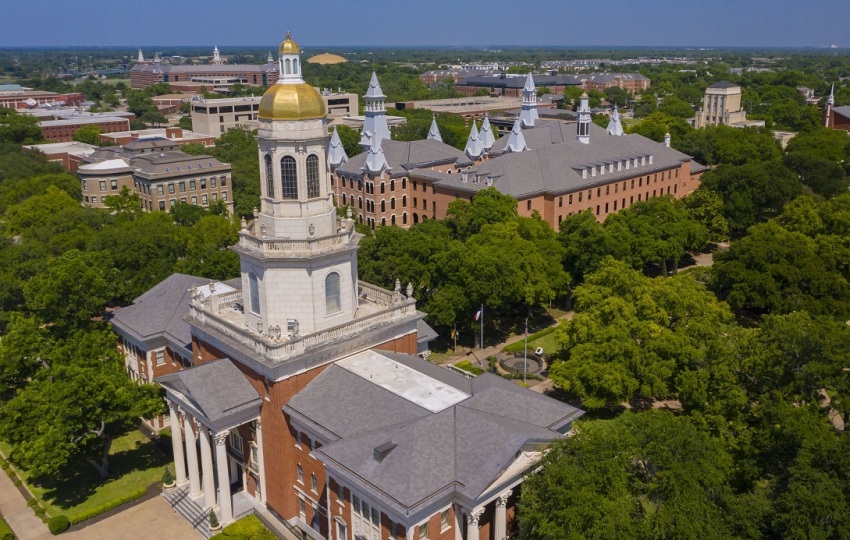Students criticize Baylor’s new diversity video; black host responds
Reaction to Floyd, race in US has too much ‘white speculation,’ campus paper says

The Baylor University student newspaper is hurling darts at a diversity video just released by the school’s administration to address racial issues, and the tape’s African American host agrees the effort is not necessarily a bull’s-eye.
The 120-year-old Baylor Lariat took aim on Friday at the 40-minute presentation, saying there was “no substantive representation of Black community members explaining their lived experiences at Baylor” and that the school community “deserves a better effort.”
“There were many legitimate critiques in the Lariat editorial,” Malcolm Foley, special adviser to the president on equity and campus engagement and director of black church studies at Baylor’s Truett Seminary, told The Christian Post on Tuesday.
The video, released earlier this month and to be updated yearly, is part of diversity training that is now required at the Baptist school for all students and staff. In reaction to the killing of George Floyd while in police custody in late May, the school’s president, Linda Livingstone, had issued a statement that Baylor would “build upon our actions to date and elevate the difficult, uncomfortable but important conversations — with actionable steps — regarding race, privilege, violence and conciliation in America.”
Along with diversity training, her plan included hosting a series of summertime virtual conversations with experts on reconciliation and repentance, continuing to increase the share of staff and instructors of color, and treating all connected with the university with respect and dignity in promoting equal opportunity and prohibiting any discriminatory practices.
The video — which can only be accessed by Baylor staff and students — features Foley conducting an interview with Livingstone, as well as a sermon by the Rev. Michael Evans, president of the Baptist General Convention of Texas and a Baylor regent, and students and faculty testifying about their experiences with discrimination, according to the Lariat.
The student newspaper took issue with Foley interviewing Livingstone rather than allowing Foley to be the subject.
“Instead of Foley asking Livingstone softball questions to be answered in platitudes of loving thy neighbor and listening with empathy, the interview should have been flipped. It should have focused on Foley’s views and experiences as a Black man at Baylor,” the Lariat argued, adding that Foley’s “role in the video gives off the appearance of tokenism as a result.”
The opinion piece called Foley “a Black moderator for white speculation on racism,” which “does not create space for genuine representation.”
In response, Foley said to CP, "That was not my role nor is my role that of a token. Rather, this conversation set a foundation for an invitation to the campus community.”
The Lariat also slammed Evans’ devotional message, dubbing it a “Love thy neighbor” homily “so drowned out in theology that most people of other faiths or no faith might have difficulty getting … the point.”
On the discrimination testimonials, the editorial argued that it had “no mention of how these events were investigated” or how the school would do better moving forward. It also slammed the use of voice-overs, arguing that “the video makes the people who hold these voices invisible.”
Baylor’s marketing and communications head told the Lariat that the administration in preparation for the video interviewed over 40 people, including students, faculty, staff and regents. The division also consulted the @DearBaylor Instagram page, which has nearly 300 posts, most complaining of racially or religiously oriented incidents in the recent past.
“The son of a BU Missions employee was recently caught yelling racial slurs at Black and Hispanic folks on Juneteenth (an African American freedom celebration)," read a July 9 DearBaylor post by an “alum” of the Graduate School. An Education School “alum” the same day recounted how in a required student life seminar a white dean twice mispronounced a Latino administrator’s name in introducing her.
A College of Arts & Science “student” in a post two days earlier wrote that a professor queried the individual over lunch and responded to the answer by saying, “Is that an Asian thing?” Another student there “called his question racist, to which he defended himself by stating that he was ‘just asking.’”
Foley told CP that “complaints about racially ignorant and hurtful comments are common in many places, but especially in predominantly white spaces. The reason is rather simple and it is the same reason why sexist comments are common in predominantly male spaces: being in the majority often (but thankfully not always!) manifests itself in suppression of the minority.”
The solution, Foley explained, comes when those offending cease their problematic behavior through repentance, empathy, humility, reaching out to colleagues of different backgrounds and seeking and receiving relevant education institutionally and otherwise.
The student newspaper said those having to watch the digital presentation also should have to engage with it or face penalties. The editorial board wanted the video to focus more tightly on race and ethnicity rather than including LGBT issues and religiously oriented incidents. The panel reiterated a Sept. 23 push for requiring of all students a graded course on racial history in the U.S.
Foley commented, “No 40-minute video, whether it is a robust historical and sociological explanation of racialization or a conversation about individual experience, can effect significant and lasting systemic change. The only way to do that is through deep self-interrogation and structures of robust accountability. This diversity education video is the beginning, an element in a matrix of actions that will hopefully lead to the building of a just and equitable culture at Baylor.”



























